The end of the CCTV era?
- Published
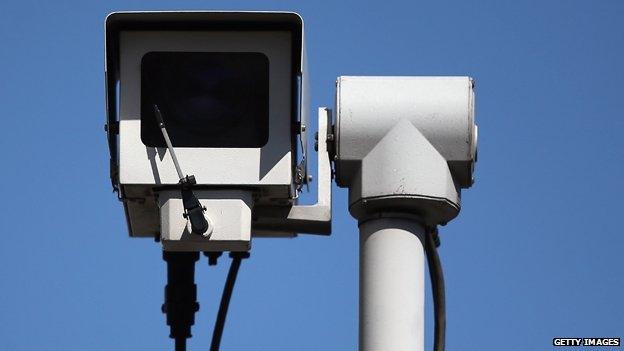
Twenty years ago the government backed a major expansion of the CCTV network - now funds are being cut and cameras shut off. Is the UK's CCTV boom over, asks Rachel Argyle.
In 1994, the Conservative government launched the Partners Against Crime initiative, with Home Secretary Michael Howard saying he was "absolutely convinced that CCTV has a major part to play in helping detect, and reduce crimes and to convict criminals".
The next year the CCTV Challenge Competition fund was started to encourage local authorities to set up surveillance schemes - the Home Office and local authorities invested £120m in CCTV systems within three years.
The UK has one of the largest CCTV networks in the world. But as cash-strapped councils look for cost-saving measures, the effectiveness of public CCTV is under scrutiny.
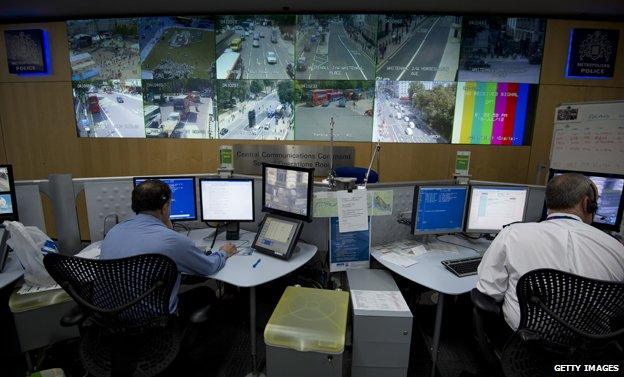
Dyfed-Powys police are set to cut funding to monitor CCTV following an independent report set up by Police and Crime Commissioner Christopher Salmon. The force covers over half of Wales and just under half a million people.
The report found that the removal of Powys Country Council CCTV did not result in a significant rise in crime or anti-social behaviour and there is little evidence that CCTV deters violent or alcohol-related crime. Salmon says the police will direct funds where the public want them, with "more bobbies on the beat".
These cuts are not an isolated case.
Cornwall was one of the first local authorities to cut their CCTV budget back in April 2011 - by £350,000. Denbighshire council will stop their funding and make a saving of £200,000 from 2016-17. Anglesey Council scrapped its CCTV altogether last year but following a successful charitable trust bid it will now be run by the island's five town councils. In Derby, 48 cameras in the city centre may be switched off.
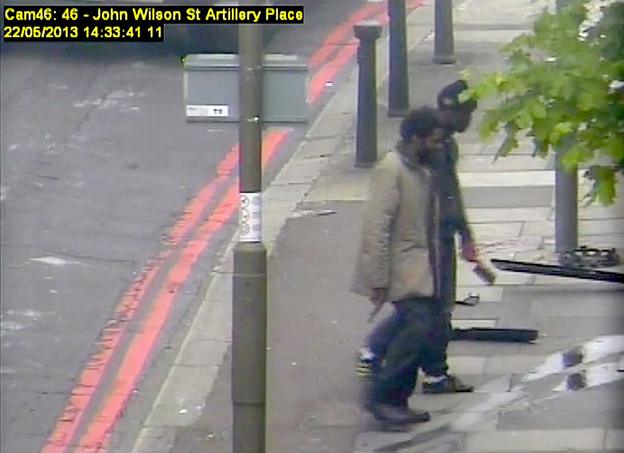
CCTV footage of Michael Adebolajo and Michael Adebowale, who murdered Lee Rigby in 2013
Other areas are scaling back. Birmingham's 250 CCTV cameras will no longer be monitored around the clock and CCTV managers across the country face redundancy.
Police are under similar financial strain. Thames Valley Police could reduce its CCTV funding for the city from £225,000 annually, to as little as £50,000 by 2018.
A Freedom of Information request by Labour MP Gloria de Piero in March 2013, found that one in five councils had cut the number of CCTV cameras on the streets since the last election.
Supporters of CCTV point to the success of cameras in identifying suspects in high-profile cases, such as Robert Thompson and Jon Venables in the murder of toddler James Bulger, the Boston Marathon bombing, the London 7 July 2005 attacks and the 2011 UK riots. CCTV was crucial in the hunt for the Charlie Hebdo attackers.
But campaigners against CCTV believe it violates personal privacy and question its effectiveness.
"Britain's crime rate is not significantly lower than comparable countries that do not have such vast surveillance," says Emma Carr, director of Big Brother Watch.
The pressure group welcomes that budgetary restraints may make authorities look more closely at whether CCTV is really working. Carr adds: "Councils that reduce the number of ineffective CCTV cameras, diverting resources to where they will keep the public safer, are to be praised."
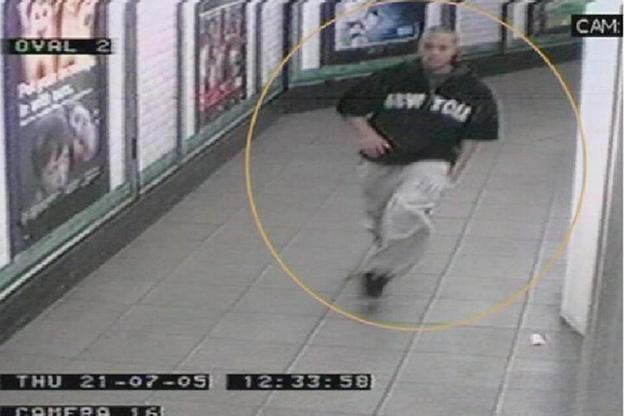
A would-be tube bomber caught on CCTV fleeing Oval Station, 21 July 2005
Charles Farrier, spokesperson for No CCTV, is a little more apprehensive. "The alleged cost-cutting is leading to a restructuring rather than a real reduction of camera surveillance." He points out that budget cuts will see others jump to the rescue. "Often the solutions offered are merging control rooms or taking the cameras out of the hands of democratic local bodies and into management by private companies driven by a profit motive," he added. He calls for an urgent public debate.
For some people, there's a more human alternative to fighting crime with increased CCTV. Farrier believes the solution lies in the findings of a 2013 report entitled Fortress Britain, published by the New Economics Foundation, which found that residents on an estate in London felt that "knowing people" was the key to creating trust.
"We no longer have park keepers, bus conductors, toilet attendants - people there to help act as a glue to hold the community together. Now we abdicate that responsibility to a machine. Surely instead of spending money on surveillance cameras it should be spent on proven strategies or encourage more people to walk, talk, and problem solve in their own communities?"
There has been much research into the effectiveness of CCTV as a crimefighting tool during the boom years.
A study entitled the Effects of Closed Circuit Television Surveillance on Crime (2008) found that CCTV schemes had little effect on crime deterrence, other than car crime.
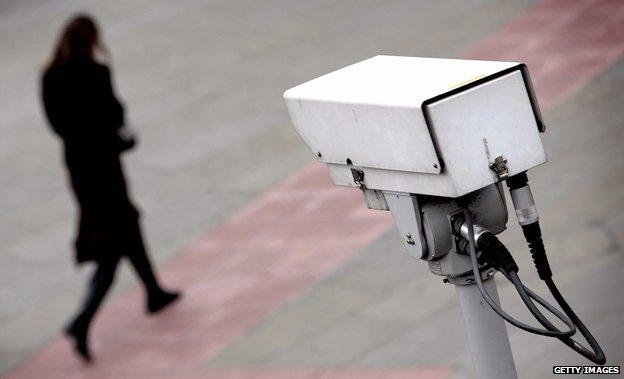
Another report, for the College of Policing in 2013, entitled What Works Briefing: The Effects of CCTV on Crime said that CCTV makes for a small, but statistically significant, reduction in crime but added that while it reduces theft of and from vehicles, it has no impact on levels of violent crime.
British psychologist Gordon Trasler has pointed out that a reason for this might be that CCTV is effective for "instrumental" offences (such as property crime or robbery) but not so effective for "expressive" offences like violent crime when behaviour is impulsive and there is no time for rational decision-making.
According to the Association of Chief Police Officers' national policing lead for CCTV, Assistant Chief Constable Mark Bates, cameras play an important part in protecting our communities. "We have a real responsibility to think carefully before making any decisions to disinvest in CCTV as a result of austerity challenges."
In 2009, 95% of Scotland Yard murder cases used CCTV footage as evidence.
So how many cameras are actually watching us? The answer is hard to nail down. The British Security Industry Association (BSIA) estimates there are between 4 million and 5.9 million cameras.
Pauline Norstrom, chair of the BSIA, says that budgetary pressure on the public sector and cuts to CCTV does not mean a wider decline in the UK. "While public sector budgets have put pressure on its cameras, private sector cameras now outnumber them by a scale of 70 to one," she said. "These are the key in deterring criminal activity and securing convictions."
While public systems may be facing cuts, there's a rise in private and domestic cameras.
This is an issue of concern for Tony Porter, the government's surveillance camera commissioner. In his annual report, he said: "The cost of domestic CCTV systems is minimal as electrical retailers now sell HD domestic CCTV systems for a little over £100." Over 80% of concerns he receives are over the use of CCTV in a domestic setting.
If councils continue to cut, consolidate or outsource their CCTV services, campaign group No CCTV fear it will be increasingly more difficult to hold those who do hold our information to account. But Porter, who took on the independent role of surveillance camera commissioner last March hopes that new guidance for domestic CCTV to be issues in the next few months will help clarify matters.
It seems the UK will continue to be closely watched for some time to come.
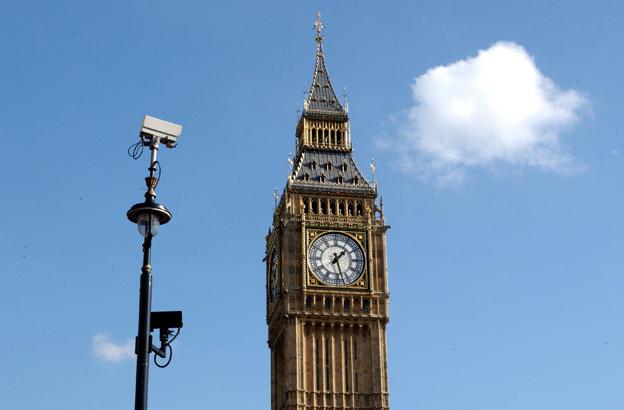

More from the Magazine
For the last 25 years CCTV has proliferated into public spaces across the UK, but is it going too far to use cameras to give parking tickets and enforce bus lane rules? (Is CCTV creeping too far? January 2011)
The Boston Marathon bombings suspects were quickly identified after investigators picked them out on CCTV footage. Does that mean Americans need to depend more on CCTV? (The rise of CCTV surveillance in the US, April 2013, external)

Subscribe to the BBC News Magazine's email newsletter to get articles sent to your inbox